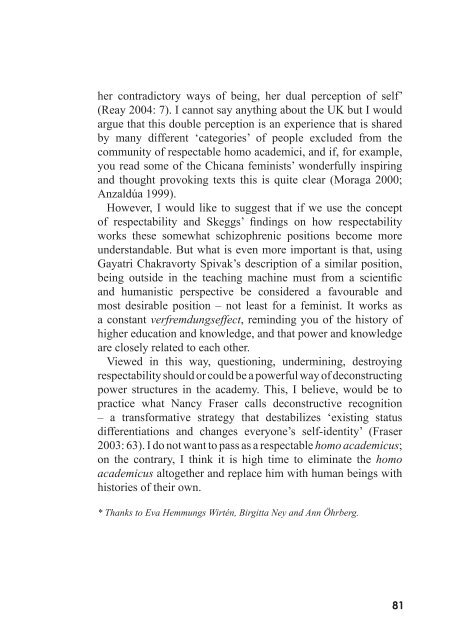Thinking with Bevereley Skeggs - Stockholms universitet
Thinking with Bevereley Skeggs - Stockholms universitet
Thinking with Bevereley Skeggs - Stockholms universitet
- No tags were found...
Create successful ePaper yourself
Turn your PDF publications into a flip-book with our unique Google optimized e-Paper software.
her contradictory ways of being, her dual perception of self’(Reay 2004: 7). I cannot say anything about the UK but I wouldargue that this double perception is an experience that is sharedby many different ‘categories’ of people excluded from thecommunity of respectable homo academici, and if, for example,you read some of the Chicana feminists’ wonderfully inspiringand thought provoking texts this is quite clear (Moraga 2000;Anzaldúa 1999).However, I would like to suggest that if we use the conceptof respectability and <strong>Skeggs</strong>’ findings on how respectabilityworks these somewhat schizophrenic positions become moreunderstandable. But what is even more important is that, usingGayatri Chakravorty Spivak’s description of a similar position,being outside in the teaching machine must from a scientificand humanistic perspective be considered a favourable andmost desirable position – not least for a feminist. It works asa constant verfremdungseffect, reminding you of the history ofhigher education and knowledge, and that power and knowledgeare closely related to each other.Viewed in this way, questioning, undermining, destroyingrespectability should or could be a powerful way of deconstructingpower structures in the academy. This, I believe, would be topractice what Nancy Fraser calls deconstructive recognition– a transformative strategy that destabilizes ‘existing statusdifferentiations and changes everyone’s self-identity’ (Fraser2003: 63). I do not want to pass as a respectable homo academicus;on the contrary, I think it is high time to eliminate the homoacademicus altogether and replace him <strong>with</strong> human beings <strong>with</strong>histories of their own.* Thanks to Eva Hemmungs Wirtén, Birgitta Ney and Ann Öhrberg.81
















